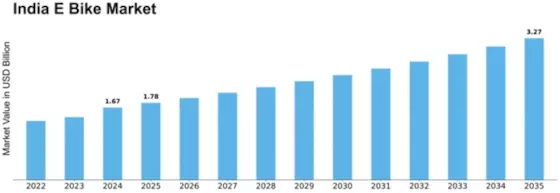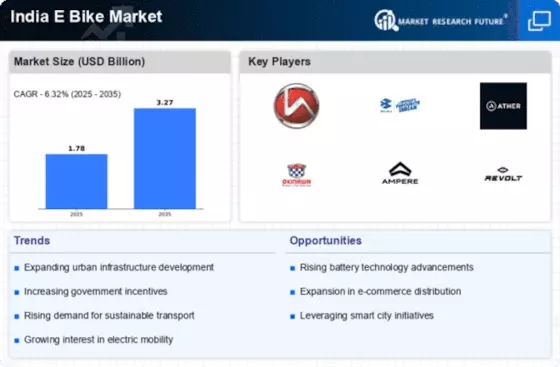India Electric Bike Size
India Electric Bike Market Growth Projections and Opportunities
The electric bike market in India is gaining momentum, influenced by a range of factors that contribute to the growing popularity of electric two-wheelers across the country. One significant market factor is the increased focus on sustainability and environmental conservation. With air pollution concerns and a desire to reduce the carbon footprint, there is a growing shift towards cleaner and greener transportation options. Electric bikes, being emission-free and energy-efficient, are increasingly seen as a viable alternative to traditional petrol-powered bikes, aligning with India's commitment to a more sustainable future.
Government initiatives and policies play a pivotal role in shaping the electric bike market in India. The Indian government has introduced various schemes and incentives to promote electric mobility, including the Faster Adoption and Manufacturing of Hybrid and Electric Vehicles (FAME) scheme. Subsidies, tax benefits, and other financial incentives aim to make electric bikes more affordable and attractive for consumers. These policy measures are crucial in creating a conducive environment for the adoption of electric bikes across different segments of the population.
The technological advancements in electric bike manufacturing are driving the market forward. As battery technology continues to improve, electric bikes are becoming more efficient, affordable, and practical for everyday use. Manufacturers are investing in research and development to enhance battery life, charging speed, and overall performance, making electric bikes a compelling option for Indian consumers. The development of lightweight and aesthetically pleasing electric bike models is also influencing consumer preferences and contributing to the market's growth.
Charging infrastructure is a critical factor that significantly influences the electric bike market in India. The availability of charging stations, both in urban centers and along highways, is essential for addressing range anxiety and encouraging the widespread adoption of electric bikes. Government and private entities are working towards developing a robust charging infrastructure, including innovative solutions such as battery swapping stations, to enhance the convenience of owning and using electric bikes.
The financial aspect plays a crucial role in the electric bike market, influencing consumer decisions. While the initial cost of electric bikes may be higher than traditional bikes, the total cost of ownership tends to be lower. Reduced fuel expenses, lower maintenance costs, and government incentives contribute to making electric bikes a financially attractive option. Financing options and affordable payment plans provided by financial institutions further facilitate the adoption of electric bikes, especially among price-sensitive consumers.
Consumer awareness and education are key market factors that influence the electric bike segment in India. While awareness about electric bikes is increasing, there is still a need for comprehensive campaigns to inform consumers about the benefits, charging infrastructure, and overall feasibility of electric bikes. Addressing any misconceptions and promoting the positive aspects of electric two-wheelers can significantly impact consumer choices and contribute to the market's growth.
Geopolitical factors, such as India's energy security concerns and global trends towards sustainable practices, also play a role in shaping the electric bike market. The government's efforts to reduce the country's dependence on fossil fuels align with the global push towards clean energy and environmentally friendly transportation. As India positions itself as a key player in the electric bike market, geopolitical considerations will continue to influence policies and initiatives supporting the growth of this segment.
The electric bike market in India is experiencing a surge in popularity, driven by factors such as environmental consciousness, government initiatives, technological advancements, charging infrastructure development, financial incentives, consumer awareness, and geopolitical considerations. The convergence of these factors creates a favorable environment for the widespread adoption of electric bikes, transforming the two-wheeler market in India towards a more sustainable and eco-friendly future.



















Leave a Comment